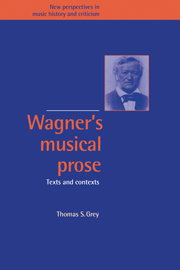Book contents
- Frontmatter
- Contents
- Preface
- 1 Wagner and the problematics of “absolute music” in the nineteenth century
- 2 Beethoven reception and the hermeneutic impulse: “poetic ideas” and new forms
- 3 Engendering music drama: Opera and Drama and its metaphors
- 4 The “poetic-musical period” and the “evolution” of Wagnerian form
- 5 Endless melodies
- 6 Motives and motivations: leitmotif and “symphonic” drama
- Appendix 1 The “poetic-musical period” (from Opera and Drama, Part III, section 3)
- Appendix 2 Principal writings of Richard Wagner cited in the text
- Bibliography
- Index
2 - Beethoven reception and the hermeneutic impulse: “poetic ideas” and new forms
Published online by Cambridge University Press: 22 September 2009
- Frontmatter
- Contents
- Preface
- 1 Wagner and the problematics of “absolute music” in the nineteenth century
- 2 Beethoven reception and the hermeneutic impulse: “poetic ideas” and new forms
- 3 Engendering music drama: Opera and Drama and its metaphors
- 4 The “poetic-musical period” and the “evolution” of Wagnerian form
- 5 Endless melodies
- 6 Motives and motivations: leitmotif and “symphonic” drama
- Appendix 1 The “poetic-musical period” (from Opera and Drama, Part III, section 3)
- Appendix 2 Principal writings of Richard Wagner cited in the text
- Bibliography
- Index
Summary
In a lecture entitled “Overinterpreting Texts,” Umberto Eco outlines an interpretive phenomenon he designates as “Hermetic semiosis,” in which not only sacred, but also culturally sacralized (secular) texts generate a tradition of highly developed, esoteric exegesis. Eco examines the case of Dante in the hands of a number of more or less obsessively monomaniacal critics going back to Gabriele Rossetti (father of the poet and pre-Raphaelite Dante Gabriel Rossetti), who avidly examined the Divine Comedy for encodings of Masonic and Rosicrucian symbolism. Similar patterns can be cited in the interpretive histories of Virgil, Rabelais, or Shakespeare. It is not surprising to find that Beethoven, among composers, has produced the closest analogue to this phenomenon in the history of music and its criticism.
The notion that Beethoven, in composing his larger instrumental works, was guided by a “poetic idea” or object which he strove to represent in music is a kind of idée fixe of the composer's critical reception from the last decade of his life through much of the nineteenth century. Arnold Schering's efforts in the 1920s and 30s to crack the secret code of what he took to be Beethoven's “esoteric” literary programs represent the belated culmination of this tradition, and Schering's zealous conviction that he was bringing to light incontrovertible truths that had hitherto remained concealed within the sounding hieroglyphs of Beethoven's scores closely parallels the tone and methodology of Eco's Dantean hermeneutes.
- Type
- Chapter
- Information
- Wagner's Musical ProseTexts and Contexts, pp. 51 - 129Publisher: Cambridge University PressPrint publication year: 1995

